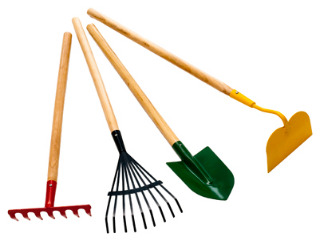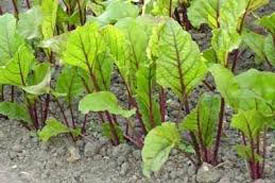Garden tools
 In the days leading up to the American Revolution, where everybody had a sufficiency garden, or market garden, metal tools were necessary. Yet, Great Britain would not allow imports of metal shovels, hoes etc. Colonialists were forced to use wooden tools. A farmer rebelled and started forgoing metal tools. This led to the famous Ames™ tools we see today in the hardware stores.
In the days leading up to the American Revolution, where everybody had a sufficiency garden, or market garden, metal tools were necessary. Yet, Great Britain would not allow imports of metal shovels, hoes etc. Colonialists were forced to use wooden tools. A farmer rebelled and started forgoing metal tools. This led to the famous Ames™ tools we see today in the hardware stores.
Trying to find a real sturdy shovel, or any tool today is difficult; much less paying what we think is an exhorbant price vice a China import. When we buy garden tools, as with any tools, we want to buy them with a warranty that the store will honor without argument. This leads us to buying at the major retail stores such as Sears, Lowes and Home Depot, or stores that state clearly there is a warranty they will honor so you do not have to mail the broken tool back to India.
When Smith and Hawkins sold garden tools from England, before they went into the Yuppie clothing business, English Bulldog™ iron forged hand tools were available. I love them, but they are heavier in my late age, surely an heirloom basic tool. Sears sells a reliable lighter weight, no argument, and lifetimes free replacement-which will occur in time. I have gone through three iron tooth rakes in twenty years.
Ideally from my perspective in tools I look for a solid stainless steel blade; and I want to tell you that I just broke the handle off a stainless life time guaranteed hand trowel (from China of course) that was pot metal filled, and just stainless steel coated. This leads us back to the concept always have more than one of the same type of tool.
If I were a double digger of beds I would look for a long handle garden fork as the extra length gives more leverage than a common short handle. I would look for a fiberglass handle to reduce the weight, also fiberglass handles are stronger than wood, and do not require winter linseed oiling before storage on the barn wall. Most of all my digging is with a round point shovel. I rarely use a square spade. I have a specialized long blade tree shovel, which I never use.
The best tools still come from England and that is where I look. You might keep an eye out for quality lightweight fiberglass handle, stainless steel tools.
There are two basic types of pruning tools, scissor blade and anvil type. For lopping off big branches the long handle Ames, with a ratchet lever for increased force in a scissor action, is excellent. For small nips the hand held anvil type is my preference as grapes and soft woods cut cleaner. For pruning tomatoes and soft garden plants I like a small scissor nipper, or just a small pair of heavy-duty kitchen scissors.
What I am trying to learn is to return the tools to wear they belong, and clean them before putting them away. Tools seem to just walk away on me. So I have spares. A splash of blaze orange marker paint sometimes helps.
With the height of the garden season upon us most everybody is now tilling up a garden. Those who do not have a rental tiller, a neighbor with a tiller, or a paid plot maker are looking to buy a tiller.
The first thought is price. Eliminate that mental thought or you will wind up with a piece of junk that is too lightweight, chain driven, cluster tines -but with E-Z Credit.
There exists only two tillers on the market that are reliable, and made for serious food production. They are the Troy Built™, and the BCS™.
Pricey? Yes, in comparison to the junk sold today, but they will last you your lifetime (with care and maintenance). My 2nd Troy Built Horse Model tiller I bought in 1980 as my retirement present, I still have it, and use it. My first Troy Built tiller I sold for what I paid for it. My second one cost under one thousand in 1980 and now sells for under two thousand dollars. This has been an always faithful, solid investment for me.
When the original factory went out of business in Troy New York in the 80’s, Murray bought up all the tools and dies. Shipped them west, and are now still used, and still making tillers to the same high standards. Contact www.troybuilt.com . When factory ordering one in the winter (no garden season) you have promotions, options, and reduced sale prices. Where you purchase your Troy Built™ locally is important because of Warranty Repair. Big Box Stores do not service what they sell. In your area Troy Built™ may not have a dealership, but the Troy Built™ people have parts they can send to you, or your repairman. Other than what I have listed below it is unlikely you will have any problems beyond basic adjustments, spark plugs, and oil changes, which you can do your self.
A warning on “Extended Warranties”. DON”T. You are wasting your time and money unless who sells it says they will honor it. Most do not-but again; aTroy Built™ tiller will not likely give you problems.
You will want the “hardened tines” which are necessary to reduce wear and frequent replacement as with non-hardened tines. The clay and sand in this area “eats” the rotating tines. Belts last for years, but it is nice to have a spare. The reversing disc will require replacement about every ten years. No big deal for these maintenance tasks. Drain the gasoline in the fall, run the engine dry, then pull on the starter rope just till it gets tight-that closes the valves so moisture does not get in the engine. This applies to all small engines. Within the Troy Built™ line, I favor the “Big Red” Horse model.
Optional extras include the hiller attachment – a must have. Buy the bumper bars for the front; a small generator is still an option. I am not keen on the shredder for grain use, although it is great for brush.
The BCS tiller is the King. Contact: here
I am thinking of buying another tiller, and the BCS will be my choice as it is all gear drive and options galore that meet my interest. Aside from the sickle bar cutter for small amounts of grain cutting the riding sulky interests me for the flat areas.
A small mini bailer is available which is ideal for goat hay at 50 lb. bales as opposed to the 1500 lb round bales that require big tractor equipment. Personally though I believe you can put up loose hay of better quality-but more labor. Blacksburg Power in my area offers the BCS, and warranty repair-which is even less likely to be needed.
Assuming you need to have a repair made after 30 years like I did, I just took my Troy into Blacksburg Power, a trusted sales and repair business, for a carburetor kit and transistor ignition. I haul it in a “Farm Use” Honey Wagon home made trailer. A trailer is invaluable for hauling to and from. You will also need a set of ramps. The best offer I have found, and ordered, was from www.sportsmanguide.com item# WX2-99942. Works with PU’s too, and folds up into a small package instead of unwieldy long ramps. These are heavy steel ramps, not aluminum.
Although I can make a garden with a round point shovel, and an iron tooth garden rake, a tiller is still invaluable to me even though I have a different style of garden beds. In many cases with small spaces it does not pay to purchase a tiller. A White House Model in size can be done without. Your tools are valuable-keep them locked up. It would be wise in the long run to learn to do your own maintenance, and have on hand spare oil, filters, and a factory maintenance manual you will follow like a bible.
Copyright: 2008, Back2theLand, Mark Steel.



